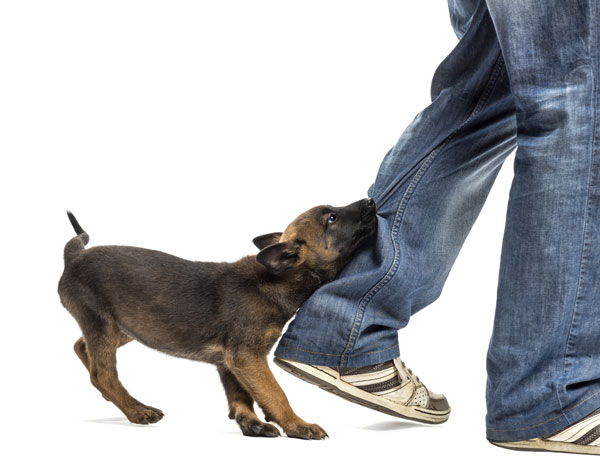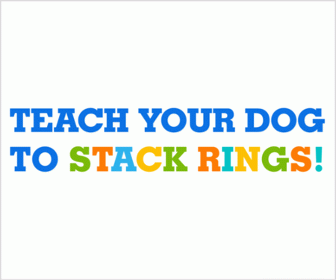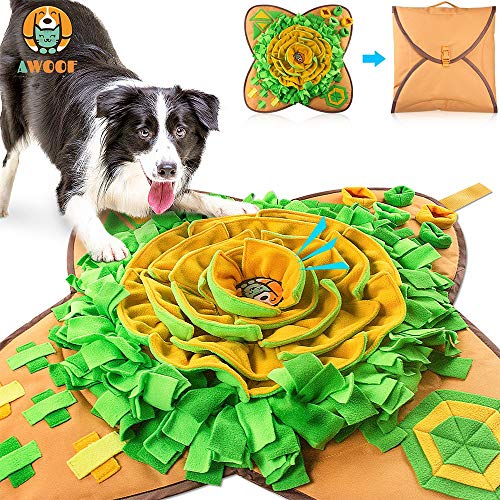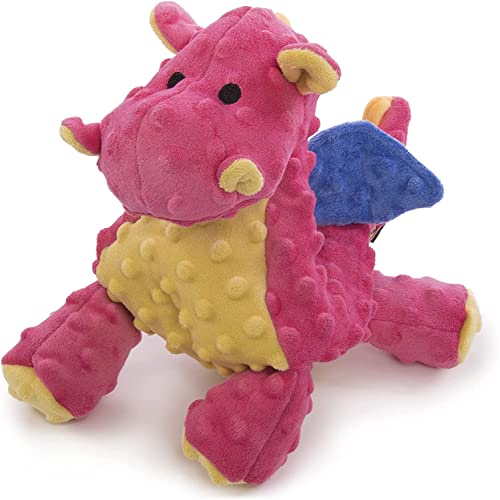When you first acquired your puppy, you may have noticed a tendency in the dog to nip at your ankles at the slightest opportunity he could find. You probably thought that this was his own idea of fun. And to some extent, you were right.
But now the dog is all grown yet he continues to nip at your ankles, feet, and even shoes and shoelaces. As a responsible pet parent, you have all the reasons to be concerned.
Everyone knows that puppies love to nip at their owners’ feet. However, they should naturally grow out of this behavior as they approach adulthood. So, if your adult dog still enjoys nipping at your ankles, it may get you wondering, why does my dog bite my feet when I walk?
Well, there are numerous possible answers to this question.
For starters, it’s worth noting that most dogs will nip at your ankles as a response to an ancestral trait. This is particularly common among dogs that were originally trained for herding or guarding. Nipping at the ankle was the primary way herd dogs managed to control cattle and steer them in a particular direction. As for guard dogs, biting the feet was their first line of attack on potential intruders.
Besides being an inherited trait, some dogs also derive fun and excitement from biting their owners’ feet. Whereas others take to this behavior when they’re bored or anxious. Certain medical conditions might also cause your pooch to nip at your ankles.
The most important thing is to understand the reasons why your dog bites your feet. After that, you can proceed to adopt the most suitable solution to stop or redirect the behavior.
Read on for more insights on why dogs bite at their owners’ feet and how to remedy this problem.
Why Do Puppies Bite Ankles When You Walk?
To understand why your dog bites your feet or ankles when you walk, it’s imperative that you first determine the dog’s age. Although many dogs nip at their owners’ feet for the same reasons, some reasons are specific to puppies while others apply only to adult dogs.
Now, you’ll realize that your puppy generally loves to bite your feet when you walk past. And the faster you move, the more bites you’re likely to receive. You might also observe that the behavior tends to be more intense when you have a trailing shoelace or if you’re wearing baggy pants.
Fun and excitement are the most common reasons why your puppy nips at your ankles. Like all young pets, puppies are full of playful energy. And they tend to play with things that move. So, the motion generated by your feet as you walk past is all it takes to trigger their play instincts.
Also, note that your feet and ankles somewhat look like bones. Which makes them even more attractive to your pup.
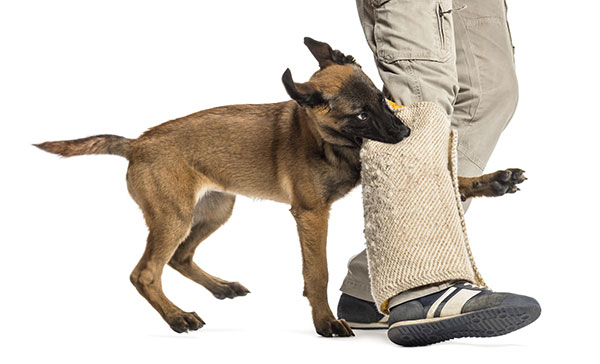
The following are other possible reasons why your puppy bites your feet when you walk.
1. Hunting instincts
Dogs are predatory animals. It doesn’t matter how many years we’ve domesticated them, they’ve not lost their hunting instincts.
Biting your feet and ankles might be one way your puppy tries to hone his hunting skills. That’s especially if you walk past the dog with a trailing shoelace.
Remember that a shoelace almost resembles the tail of a mouse. And a mouse is just what your puppy needs for target practice.
2. Investigative behavior
Puppies investigate the world around them primarily through their mouths. The same behavior is common with human babies who tend to put objects into their mouths, including things that are clearly inedible.
Of course, human babies might also explore the world using their hands. Unfortunately, that’s not the case with dogs.
So, the only way your pup will figure out what your feet feel like is by nipping at them when you walk by.
Puppies that nip at their owners’ ankles due to investigative behavior also tend to bite the feet of their fellow litter mates. Therefore, take time and check how the pups play amongst themselves. If their playtimes are marked by constant nipping, then you can conclude that there’s nothing to be worried about.
3. Teething
Teething might also cause your puppy to bite your feet. Generally, puppies begin teething between 5 and 6 weeks. They then shed their baby teeth between their 12th and 16th week, after which they grow adult teeth.
During teething and shedding of baby teeth, a puppy’s teeth can feel painful and itchy. In such situations, the dog might choose to chew or bite objects (including your ankles) as a way of relieving the unpleasant sensation.
You can tell that your puppy is teething if the dog also chews on other things, such as shoes, toys, furniture, and basically anything he can get his teeth on. You might also want to look for swollen gums or blood on the things that he bites. Teething puppies also tend to drool a lot.
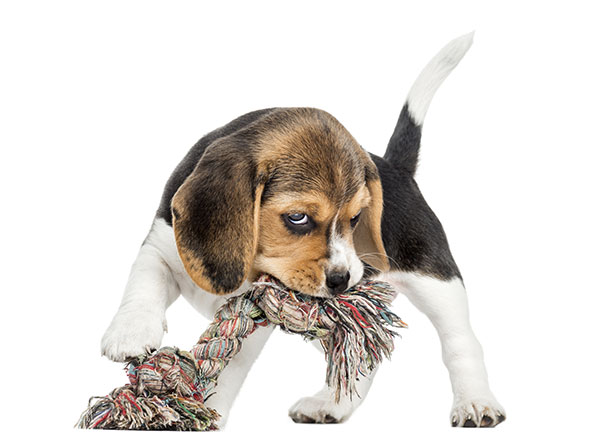
Why Do Dogs Bite Ankles When You Walk?
We’ve just highlighted some of the reasons why puppies bite their owners’ feet and ankles. In most cases, puppies will grow out of this behavior.
But what if your dog is all grown yet the problem of nipping at your feet persists?
Well, here are some reasons that could cause a mature dog to bite his owner’s feet.
1. It’s ingrained in his DNA
Most adult dogs have far more developed brains than puppies and they’ll easily know that biting your feet might cause you pain. So, a mature dog will rarely nip at your feet in response to his hunting instincts.
However, there are other kinds of instincts at play here, including herding and guarding instincts.
But why do herding dogs bite ankles?
Dog breeds that were originally bred for herding are hardwired to bite at their owners’ ankles. For such dogs, your walking movement is all it takes to trigger their herding instincts. It’s worth noting that biting of the feet in response to herding instincts is not always a sign of bad behavior. In fact, the biting tends to be less frequent and less intense compared to when it’s triggered by other reasons.
Also, it’s not like your pooch considers you to be cattle. Instead, the biting response comes naturally as it’s all ingrained in the dog’s DNA.
Just like herd dogs, guard dogs also have a tendency for ankle nipping. But the nipping is usually directed at other people as opposed to the dog’s owners.
You may have always wondered, why does my dog attack people’s feet? Or, why does my dog bite other dogs’ ankles?
Well, the behavior could be indicative of a dog that was bred for guarding.
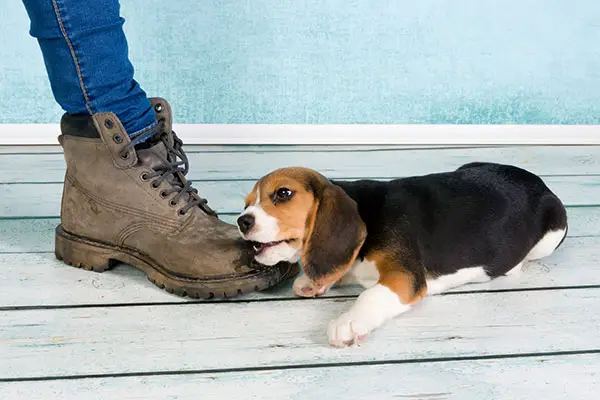
2. Fun and excitement
Dogs love to play a lot. And most dogs delight in playing with their owners.
Because your dog can’t speak, you don’t expect him to come to you and verbally invite you to play with him. Instead, the dog may choose to nip at your feet. The animal understands that biting at your ankles will possibly get you up and playing.
You may also realize that the faster you walk away from the dog, the more intensely he bites your feet.
Maybe you’ve always wondered, why does my dog bite my feet when I run?
As we’ve just pointed out, running away from a dog that’s trying to invite you to play with him will only earn you more bites at your ankle.
3. Redirected aggression
Some dogs may bite at their owners’ feet as a form of redirected aggression. This aggression usually develops from fear, anxiety, or frustration.
For instance, your dog may feel anxious at the sight of other dogs in the neighborhood or the sound of fireworks. The animal may also feel frustrated by his inability to retrieve a bone from the kitchen shelf. Without knowing where to direct his aggression, the dog may turn to you and bite your feet.
It’s important to understand your dog’s body language and know when he is exhibiting aggressive behavior. That’s because bites inflicted due to redirected aggression may be unbearably painful.
Some of the signs of aggression include body stiffness, baring of teeth, and quick, repeated bites.
4. Attention-seeking behavior
Dogs are attention-craving animals. And they can resort to all manner of aberrant behaviors when they feel that they aren’t getting their fair share of attention.
Biting at their owners’ feet is one such behavior. Your pooch might nip at your ankles as a way of reminding you to look at him, feed him, or just treat him right.
Biting at your feet might also be a way the animal attempts to draw your attention to an imminent danger.
5. Possessive behavior
It’s not unusual to come across a dog owner wondering, why does my dog bite my feet when I leave?
The most plausible answer is that the animal is highly possessive of you.
A possessive dog would want you to stay by his side all the time. Any attempts to leave may be met with short, painful bites.
Still on possessive behavior, a dog may bite your feet if you happen to be holding or standing in the way of something that belongs to him, such as his food bowl or favorite toy. It’s the dog’s way of telling you to give up his food bowl or toy, or simply get the hell out of his way.
In some cases, the behavior may also be accompanied by barking and growling.
6. Inadequate stimulation
Dogs that do not receive enough physical and mental stimulation will almost always bite their owners’ feet. This is more common among dogs that spend a great deal of their waking hours alone. Loneliness breeds boredom, which only makes a dog more withdrawn than active.
Physical stimulation is mostly achieved through exercise, whereas mental stimulation is achieved through toys. A dog that misses either or both of these primary requirements will have too much pent-up energy in him. And without enough ways to release that energy, the animal may resort to biting at his owner’s feet.
Most dogs that bite their owners’ feet out of inadequate stimulation will do so at night.
So, you might have wondered, why does my dog bite my feet at night? Or, why does my dog bite my feet under the covers?
Well, it’s all the dog’s way of wanting to release his pent-up energy.
- RICH FEEDING GAME – Look at the Big Orange Flower in the middle of the snuffle mat dog puzzle toys. Total 4 layers of orange petals can hide large…
- EXTRA FUN ATTRACTS YOUR PUPPY – We are extremely positive of our snuffle mat. But in order to provide more fun for lovely puppies, we set up 4…
- EXCELLENT RELEASE BUCKLE DESIGN – Have you ever bought a snuffle mat for your dog that want to develop good habits in your dog. But your dog likes…
Last update on 2025-01-13 / Affiliate links / Images from Amazon Product Advertising API
7. Lack of training
As we already indicated, puppies generally grow out of ankle biting.
But if your dog still bites at your feet despite his adult age, then the problem might come down to a lack of training during his formative months.
In this case, the best solution would be to train or retrain the dog.
8. The dog is in pain
Pain naturally causes dogs to bite. If your dog is in pain, he may bite your feet to prevent you from touching him in the tender places.
It’s not like the dog is aggressive or anything. Nipping at your feet is simply the dog’s own way of letting you know that he is in pain.
Some dogs may be too wise not to bite your ankles. Instead, they could choose to warn you by air snapping if they think you’re going to touch them in the sore area.
A dog may also bite your ankle out of pain if you accidentally step on him. This is the dog’s instinctive response to protect the hurt area or stop you from inflicting any further pain on him.
9. You inadvertently encouraged the behavior
Many undesirable pet behaviors are actually reinforced by the pet parents themselves.
For instance, if you usually find your dog sleeping on your bed but draw him away using a treat, the animal will eventually associate your bed with a treat. The same case applies to biting at your feet.
Remember your initial reactions when your dog began nipping at your ankles!
Did you throw a bone at him? Did you lure him away using a chew toy? Unknown to you, you might have inadvertently reinforced the behavior.
In the same breath, note that yelling or shouting at the dog might also produce undesirable results. That’s because dogs interpret yelling as an encouragement to continue with a specific line of action.
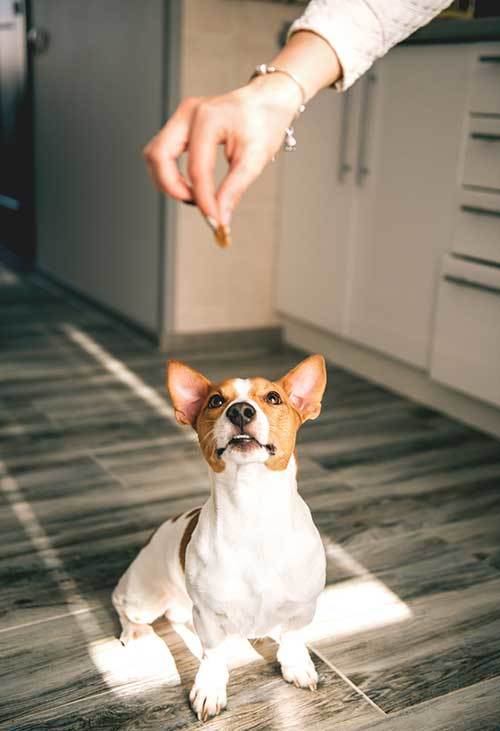
10. Underlying medical conditions
Certain medical conditions might cause your dog to nip at your feet. One such disease is separation anxiety.
Separation anxiety is an anxiety disorder that affects dogs who are left for extended durations without enough physical or mental stimulation.
The condition is mostly characterized by intense restlessness whenever you’re about to leave the house and overly-excited greetings whenever you come back home.
Perhaps you’ve always wondered, why does my dog bite my feet when I get home?
Well, you could be dealing with a case of separation anxiety.
Other common symptoms of separation anxiety include escaping, pacing, excessive chewing, and pooping/peeing in inappropriate places.
Besides separation anxiety, any disease that predisposes your dog to aggression might make him bite or nip at your ankles. Some of these conditions include rabies, hypothyroidism, hyperkinesis, psychomotor epilepsy, and neoplasia.
- ACTIONABLE HEALTH INSIGHTS: Test for over 270 genetic health conditions and get actionable insights to help you give your pup the best care possible….
- MOST ACCURATE BREED IDENTIFICATION: Test for over 350 dog breeds including dingoes, coyotes, wolves, and village dogs. Using a research-grade…
- TRAIT INSIGHTS THAT HELP YOU BE MORE PREPARED: Test for 55 physical traits. Size, coat, grooming needs — your dog’s traits don’t just make them…
Last update on 2025-01-13 / Affiliate links / Images from Amazon Product Advertising API
How to Stop Your Dog from Biting Your Feet
We’ve highlighted a variety of reasons that could make your dog bite at your feet. Regardless of how harmless it feels, ankle biting might eventually become uncomfortable for most dog owners.
Fortunately, there are numerous reasons to stop or redirect this unpleasant behavior.
For starters, you’ll need to establish when the dog bites your feet the most, as well as any other accompanying behavior.
Here’s a summary of the various behaviors that might accompany ankle biting and what each behavior indicates;





The next step is to determine the dog’s age. By now, you should already know that puppies generally bite at their owners’ feet for different reasons than adult dogs.
One effective tip on how to stop puppy biting ankles when walking is to offer the dog positive distraction, such as a chew toy. Distracting your puppy will be particularly helpful if his ankle biting is triggered by the need to play or investigate.
Alternative chew toys may also help teething puppies. However, your best bet here would be to take the dog to the vet for further checkup.
- package height : 31.75 cm
- package length : 6.35 cm
- package width : 16.256 cm
Last update on 2025-01-10 / Affiliate links / Images from Amazon Product Advertising API
The last step is to determine your dog’s breed. As you shall find, certain dog breeds have a higher predisposition to ankle biting compared to others.
The most common dog breeds associated with ankle biting include;
- Australian Cattle Dog
- Australian Shepherd
- German Shepherd
- Belgian Sheepdog
- Belgian Telvuren
- Belgian Laekenois
- Belgian Malinois
- Bergamasco Sheepdog
- Icelandic Sheepdog
- Shetland Sheepdog
- Pyrean Shepherd
- Old English Sheepdog
- Polish Lowland Sheepdog
- Border Collie
- Bearded Collie
- Berger Picard
- Miniature American Shepherd
- Pembroke Welsh Corgi
- Finish Lapphund
- Entlebucher Mountain Dog
- Spanish Water Dog
- Swedish Vallhund
As you may have realized from the above list, most dogs with a tendency for ankle biting also happen to be herd dogs.
Once you’re armed with information regarding your dog’s age and breed as well as other behaviors that accompany ankle biting, you can implement any of the following measures to stop the animal from biting at your feet.
1. Give the dog enough stimulation
Dogs should be exercised as regularly as possible. Exercise tires down a dog and allows him to release his pent-up energy.
Dogs that receive enough physical exercise will be less motivated to bite your feet or expend their energies in other undesirable ways.
Adequate stimulation may also counter the effects of boredom, loneliness, stress, and anxiety.
As you take care of your dog’s physical exercise, also be mindful of his mental needs by offering him enough toys. Toys can go a long way in relieving separation anxiety, especially for dogs that spend much of their time alone.
When looking for the perfect dog toys, insist on those that help to elicit maximum mental stimulation. Examples include chew toys, interactive ball launchers, puzzle toys, or laser-guided toys.
- YOUR ALL-IN-ONE PET MONITOR — With Petcube Play 2 Wi-Fi pet cam, check on your pet anytime from your phone with 1080p HD video, 160° ultra…
- PLAY WITH LASER FROM YOUR PHONE — With a built-in pet and human-safe laser toy, controlled from your phone, or set to autoplay mode to entertain…
- CHAT WITH YOUR PET — With high-quality 2-way audio, you can hear and speak to your pet when away, and they can reply back. Enjoy excellent sound…
Last update on 2024-12-25 / Affiliate links / Images from Amazon Product Advertising API
2. Ignore the dog
Another way you can stop a dog from nipping at your heels is to act indifferent to him. This is especially true for dogs that nip their owners’ ankles out of excitement or as attention-seeking behavior.
If you don’t react at all to ankle biting, the dog may feel demotivated and look for fun elsewhere.
Note that it may be challenging to keep still when your dog bites your feet as some bites can be excruciatingly painful. But if you’re able to resist all sorts of movement, the animal might eventually become disinterested in your feet.
3. Train or retrain the dog
This is arguably the most effective way to stop ankle biting. Here’s a simple training you can try;
i. Allow the dog/puppy to latch on your feet.
ii. Say the “stop” command and watch what happens.
iii. If the dog stops, tell him to “sit”.
iv. Pat him on the back or give him a light head rub so that he knows you appreciate his obedience.
Note that you may not achieve desirable results on the first attempt, especially if you’re training a puppy. But don’t give up. On a long enough timeline, the dog will eventually know that ankle nipping is bad behavior.
Also, do not forget to reinforce the training using treats, such as chew toys or bones. Most importantly, unleash the treat at the right time so that the dog views it as a reward for good behavior.
- DOGS AND CATS LOVE OUR ALL NATURAL TREATS: Freeze dried salmon are great high value treats. They are non-greasy – perfect for training, as a food…
- 100% FREEZE DRIED WILD CAUGHT ALASKAN SALMON: Our treats are excellent for pets with allergies, sensitive stomachs, diabetes, or dietary requirements….
- HEALTHY SKIN & COAT: Salmon is a natural source of nutrients and fish oil that contain essential fatty acids like Omega 3, Omega 6, Magnesium, Zinc,…
Last update on 2025-01-10 / Affiliate links / Images from Amazon Product Advertising API
Conclusion
There are various reasons why dogs nip at their owners’ feet. Although ankle nipping tends to be common among puppies and certain dog breeds, no dog is totally immune from the problem.
Fortunately, there are numerous tips you can implement to stop, redirect, or even prevent this unpleasant behavior. Should the problem persist despite your best efforts, take the dog for professional checkup.
Checkout Our Favorite Dog Products
1. BEST PUPPY TOY
We Like: Snuggle Behavior Toy with Heart Beat & Heat Pack – Ideal toy for new puppies.
2. BEST DOG TRAINING PROGRAM
We Like: Doggy Dan The Online Dog Trainer – Stop any dog problem and raise the perfect puppy with The Online Dog Trainer.
3. BEST DOG DNA TEST
We Like: Embark Dog DNA Test – Embark screens for over 250 dog breeds + tests for 170+ genetic diseases including MDR1 drug sensitivity, glaucoma, degenerative myelopathy, and dilated cardiomyopathy, some of the most common adult-onset diseases in dogs.
4. Best Bone Broth for Dogs
We Like: (Solid Gold – Human Grade Bone Broth for Dogs) – Simmered Beef Bone Broth With Turmeric Provides A Nutrient-Dense And Flavorful Addition To Your Dog’s Meal + Rich In Natural Collagen From Beef Bones.
5. Best Multivitamin for Dogs
We Like: PetHonesty 10-For-1 Multivitamin – 10 Benefits in 1 Daily Treat – These Multivitamin Snacks combine a well-rounded blend of the most essential vitamins and supplements including glucosamine, probiotics, vitamins and omegas, for dogs’ overall daily health.

